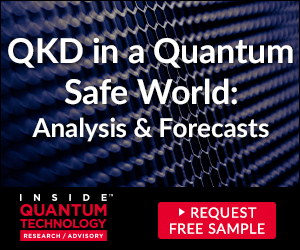Quantum News Briefs: January 13, 2024: World Economic Forum identifies AI and quantum computing as emerging global threats; Moody’s Investor Service finds innovations in quantum computing, and AI may strain cyber resources in 2024; Quantum Computing Market Poised to Hit Striking USD 8,285.6 Million Valuation Market.Us finds; and MORE!

Quantum News Briefs: January 13, 2024:
World Economic Forum identifies AI and quantum computing as emerging global threats

The World Economic Forum’s 19th Global Risks Report, while addressing artificial intelligence (AI) as a global threat, places significant emphasis on quantum computing as a key area of concern. The report examines how quantum computing, an advanced system heavily reliant on AI, poses risks to the current technological landscape and raises substantial security issues. It categorizes quantum computing alongside other frontier technologies like biotechnology and geoengineering, highlighting its potential adverse outcomes. Despite acknowledging the productivity benefits of AI in various fields, the WEF report notes the disruptive capabilities of quantum computing, suggesting it could significantly alter existing tech paradigms. The report urges regulation and public education on these technologies, particularly quantum computing, to mitigate risks. This call to action is reinforced by the recent global declaration on AI safety, signed by leaders from 29 countries and the European Union, emphasizing the need for cautious and informed management of rapidly evolving tech like quantum computing.
Moody’s Investor Service finds innovations in quantum computing, and AI may strain cyber resources in 2024
![]()
In its latest report on the cyber risk outlook for 2024, Moody’s Investors Service has identified quantum computing and artificial intelligence as emerging technologies that could significantly strain cyber resources. The report acknowledges that while these technologies promise substantial benefits, they also bring forth new risks, necessitating costly expansions in cyber defenses for organizations. This financial burden is particularly concerning as it coincides with existing economic challenges faced by these organizations. Moody’s emphasis on the dual nature of these technologies—beneficial yet risk-laden—highlights the evolving landscape of cybersecurity and the need for strategic investment and preparedness in the face of technological advancements.
Quantum Computing Market Poised to Hit Striking USD 8,285.6 Million Valuation Market.Us finds
In 2023, the Global Quantum Computing Market was valued at USD 719.3 million and is projected to skyrocket to USD 8,285.6 million by 2032, growing at an impressive CAGR of 31.2%. This rapid growth is driven by the unique capabilities of quantum computing, which merges computer science and quantum theory to perform calculations at speeds unachievable by traditional computers. While it offers groundbreaking solutions across various sectors, the quantum computing market also faces challenges like qubit errors and the need for extremely low operating temperatures. The market sees significant growth in machine learning applications and financial intermediation, with cloud-based deployment increasingly becoming preferred. Thanks to technological advancements and strong digital initiatives, North America and Europe are leading regions in this market. Key players like IBM, Google Quantum AI, and Microsoft are crucial in driving the market forward with continuous improvements in quantum computing technologies. This market’s potential to solve complex problems and streamline industry operations marks it as a transformative force in the technological landscape.
In Other News: IQT Co-Founder Lawrence Gasman quoted in Cybersecurityintelligence.com article: “China Cancels Encryption”
![]()
Chinese scientists have reportedly developed an algorithm that can crack 2048-bit RSA encryption using a 372-qubit quantum computer, a significant advancement from the 1990s theoretical basis of quantum computing’s decryption capability, highlights a CyberSecurityIntelligence.com article. This method combines classical and quantum computing techniques, potentially threatening a wide range of secure communications. Lawrence Gasman, co-founder of Inside Quantum Technology, expressed skepticism but acknowledged the severity of the implications if the claims are true. He highlighted the alarming possibility that such encryption could be broken not by a future, sophisticated quantum computer but by one that is relatively simple and could exist soon. Gasman’s concern is echoed by Andersen Cheng, CEO of Post-Quantum, who, while doubtful of the current claims, agrees that a sufficiently powerful quantum computer is an inevitable development. This potential breakthrough has prompted the U.S. government to urge federal agencies to transition towards quantum-safe encryption, indicating a significant shift in cryptographic standards and the urgency for institutions to adopt quantum-safe solutions to protect their data and network security.
Kenna Hughes-Castleberry is the Managing Editor at Inside Quantum Technology and the Science Communicator at JILA (a partnership between the University of Colorado Boulder and NIST). Her writing beats include deep tech, quantum computing, and AI. Her work has been featured in Scientific American, Discover Magazine, New Scientist, Ars Technica, and more.


























